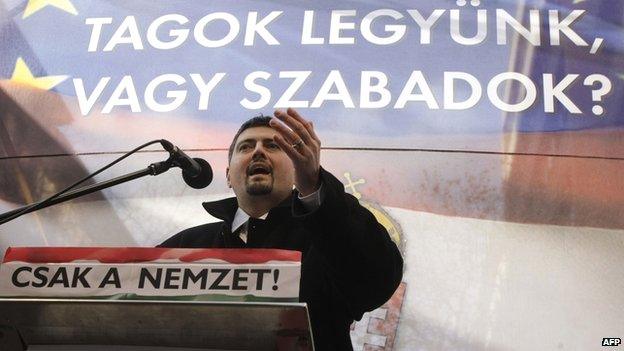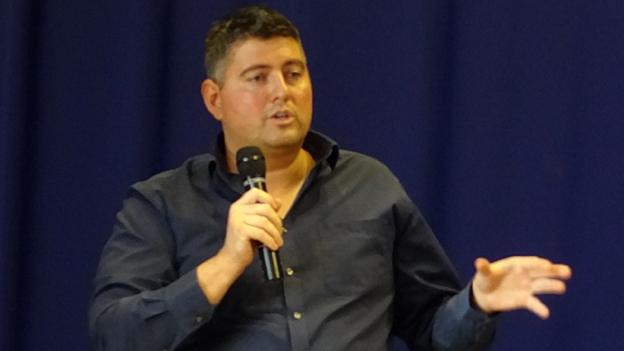What happened when an anti-Semite found he was Jewish?
- Published

Three years ago, a Hungarian far-right politician with a strong line in anti-Semitism discovered that he was Jewish. He left his party, and set out on a remarkable personal journey to learn and practise his Jewish faith.
Only seconds before he goes on stage, Csanad Szegedi paces the school corridor like a bear in an unfamiliar forest. Then the headmaster's introduction is over, the pupils who pack the hall are clapping enthusiastically, and the big man is going up the steps, the blood roaring in his ears.
The confidence returns and he plays to the crowd, just as he once did at party rallies, or as a member of the European Parliament.
He comes across a bit like the American singer Johnny Cash. "Hello, I'm Csanad Szegedi." And the schoolchildren of the Piarist Secondary School in Szeged hang on every word.
"I'm speaking to you here today," says the tall chubby faced man, with small, intelligent eyes, "because if someone had told me when I was 16 or 17 what I'm going to go tell you now, I might not have gone so far astray."
As deputy leader of the radical nationalist Jobbik party in Hungary, Szegedi co-founded the Hungarian Guard - a paramilitary formation which marched in uniform through Roma neighbourhoods.
And he blamed the Jews, as well as the Roma, for the ills of Hungarian society - until he found out that he himself was one. After several months of hesitation, during which the party leader even considered keeping him as the party's "tame Jew" as a riposte to accusations of anti-Semitism, he walked out.

Members of the Magyar Garda, or Hungarian Guard
Not a man to do things in half-measures, he has now become an Orthodox Jew, has visited Israel, and the concentration camp at Auschwitz which his own grandmother survived.
He discovered that his grandmother wore long-sleeved shirts, or a plaster in summer, to cover the tell-tale concentration camp number tattooed on her arm. As his old personality collapsed, Szegedi performed radical surgery on himself. He even set fire to copies of his own biography, I Believe in the Resurrection of the Hungarian Nation.
Today he speaks to the students without notes, sometimes striding along the stage, sometimes sitting back in a chair, but keeping their attention with a mixture of confessions, family histories, and jokes.
His volte-face seems complete - there are giggles from the girls, awkward squirming from the boys in the audience as he describes his circumcision. Then come the questions.
"Did you know any Jews before you discovered your own Jewish roots? How do you react when you hear anti-Semitism expressed today? Were you a practising Christian before you practised Judaism? Was it hard to break with your party?"
The answers are straightforward.
"Anti-Semitism doesn't need Jews, because its based on false premises. It is the projection of one's own fears, and lack of self esteem." He had a Protestant wedding, but was never christened. Every rupture was hard, but he tried to do it peacefully, and state firmly his own mistakes. And also did his duty to point to the extremism in his old party.

Later, we meet in a Budapest flat in a popular pedestrian street - one of several he rents out. While once he sold far-right paraphernalia, like T-shirts and flags, he's now moved into real estate, with equal success.
It's as though everything he touches turns to gold.
What does he think of the new, more moderate direction, imposed on his former party by leader Gabor Vona? I ask. If Vona succeeds, might he even consider rejoining it, this time as a practising Jew, rather than an anti-Semite?
Szegedi laughs. "Only the BBC would ask me that question!"
"Vona had to turn to the centre. But the party is still full of people who joined it for its radicalism, its nationalism, its extremism. And they don't want anything less now. So there is a limit to how moderate it can become." There is no way back into politics for him, he insists.
Still a patriot, he defends his people from the slur of racism. Hungarian people are not anti-Semitic, although there is an anti-Semitic discourse in society, he says.
In fact, Budapest is a great place to be a Jew in, he beams - with its kosher restaurants, synagogues, and Jewish shops. You can practise your culture, and practise your faith here. You might get funny looks if you wear a kippah - a traditional Jewish skullcap - but you won't be spat on, or physically threatened as you might be in France or Belgium.
"The paradox of Hungarian nationalism," says the man who used to fly its banner, "is that we are proud of our own achievements, but we're not willing to look at those of other peoples. We're afraid their cultures might be as valuable as ours."
How to listen to From Our Own Correspondent, external:
BBC Radio 4: Saturdays at 11:30 BST
Listen online or download the podcast.
BBC World Service: At weekends - see World Service programme schedule or listen online.
Subscribe to the BBC News Magazine's email newsletter, external to get articles sent to your inbox.